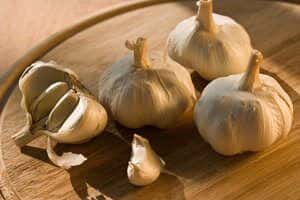
As the days grow shorter and the weather colder, many of us are looking for ways to ward off colds. Some families have strong traditions that they have used to try to avoid sniffles and sneezes. Perhaps your great-grandmother dosed everyone in the family with cod liver oil. Or maybe she insisted on garlic for preventing a cold. Not everyone loves garlic, but one reader found a novel way to dose up.
Garlic-Stuffed Olives as a Cold Remedy:
Q. You have written about ways to stop a cold. I have long used garlic at the first sign of colds as well as mild urinary tract infections.
The taste of garlic doesn’t thrill me, but I’ve found that four garlic-stuffed olives eaten a couple of times a day for three or four days is effective. The olives help mask the taste of the garlic.
A. Thank you for suggesting an innovative way to consume garlic as a cold remedy. Sadly, there is very little research on the use of garlic to avert a cold (Cochrane Database of Systematic Reviews, March 14, 2012). However, scientists have found that it has antiviral, antifungal and antibacterial effects (Viruses, April 25, 2023; Frontiers in Microbiology, Nov. 16, 2022; In Vivo, May-June 2022).
Other readers have also reported success with garlic against colds. That said, many people cannot tolerate raw garlic.
Garlic to Ward Off Colds:
As far back as Hippocrates, healers used garlic for toothaches and chest pain. Grandmothers have been administering garlic for centuries to overcome colds and other respiratory infections.
Although there is not much scientific evidence to validate garlic’s power against viral infections, eating two cloves daily may keep others so far away that they can’t give you their colds. Conversely, if you are treating a cold with garlic, you may keep others far enough away that they don’t catch it as easily.
We have heard from readers who appreciate the power of garlic and are convinced that it is effective against colds.
Reader’s Testimonial:
Q. I have been eating two cloves of raw garlic every day at my evening meal. It may be a coincidence, but I have not had a cold in over 10 years and I don’t get sick for any other reason either. I’m 84 years old and am shooting for 120.
A. The Cochrane Collaboration is an objective group of worldwide scientists that examines all the available evidence for standard and alternative treatments.
Fifteen years ago, the Cochrane analysts concluded:
“There is insufficient clinical trial evidence regarding the effects of garlic in preventing or treating the common cold. A single trial suggested that garlic may prevent occurrences of the common cold, but more studies are needed to validate this finding. Claims of effectiveness appear to rely largely on poor quality evidence.” Cochrane Database of Systematic Reviews, July 8, 2009
There is more recent evidence in the Cochrane Database, however. In 2014, reviewers found a study that met their criteria. In this double-blind controlled trial, 146 volunteers took either garlic or placebo tablets for three months. They recorded any cold symptoms they experienced in a diary. There were 24 colds among people taking garlic compared to 65 colds among those on placebo. The Cochrane evaluators did not change their conclusion that there is too little evidence to tell whether garlic can ward off colds, however. One study is not enough.
There is also a study suggesting that aged garlic extract might boost the immune system (Journal of Nutrition, Feb., 2016). In this controlled trial, people taking the extract got just as many colds as those taking placebo. Their symptoms were less severe, however, and they recovered more quickly.
Onions as Well as Garlic to Ward Off Colds:
Q. You may be interested in my family’s cold remedy. My mom always used to saute chopped garlic in olive oil, spoon it up and put a little salt on it. Then she would put it in a cool spoon and give it to my sisters and me when we had just the beginning of the sniffles. They would go away fast. I’m originally from Peru.
A. We appreciate family remedies that have been passed down for generations. Many cultures value garlic and onions for their healing properties.
Onion Syrup:
Readers tell us that onion syrup has been used against coughs for decades. The onion was sliced thinly and cooked slowly with some sweetening and a little liquid.
Here is one reader’s story:
“My mother prepared onion syrup when I was a child in the 1940s & 50s, but she used honey instead of sugar.
“On my first trip to India in 1986 I accompanied a local doctor to villages where she was teaching assistants to distinguish between minor ailments that could be treated with local remedies and major problems that needed professional care in the nearest large village. One of the remedies used for minor coughs was an onion syrup sweetened with natural sugar processed from the local sugarcane fields.”
We like the idea that an onion relative, garlic, would also be helpful against colds. This aromatic bulb has been used against colds, flu, fever and a host of other complaints. There are many other traditional family cold remedies, including ginger tea, hot toddies and Joe’s mother’s chicken soup recipe, in our Guide to Coughs, Colds & the Flu
Citations
- Lissiman E et al, "Garlic for the common cold." Cochrane Database of Systematic Reviews, March 14, 2012. DOI: 10.1002/14651858.CD006206.pub3
- Hu J et al, "Allicin inhibits porcine reproductive and respiratory syndrome virus infection In Vitro and alleviates inflammatory responses." Viruses, April 25, 2023. DOI: 10.3390/v15051050
- Li Z et al, "Allicin shows antifungal efficacy against Cryptococcus neoformans by blocking the fungal cell membrane." Frontiers in Microbiology, Nov. 16, 2022. DOI: 10.3389/fmicb.2022.1012516
- Jung H et al, "Anti-inflammatory and anti-bacterial effects of allicin-coated tracheal tube on trachea mucosa." In Vivo, May-June 2022. DOI: 10.21873/invivo.12819

